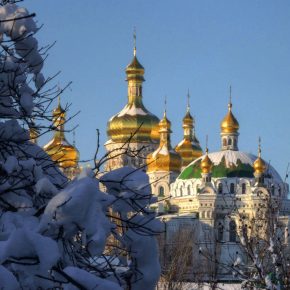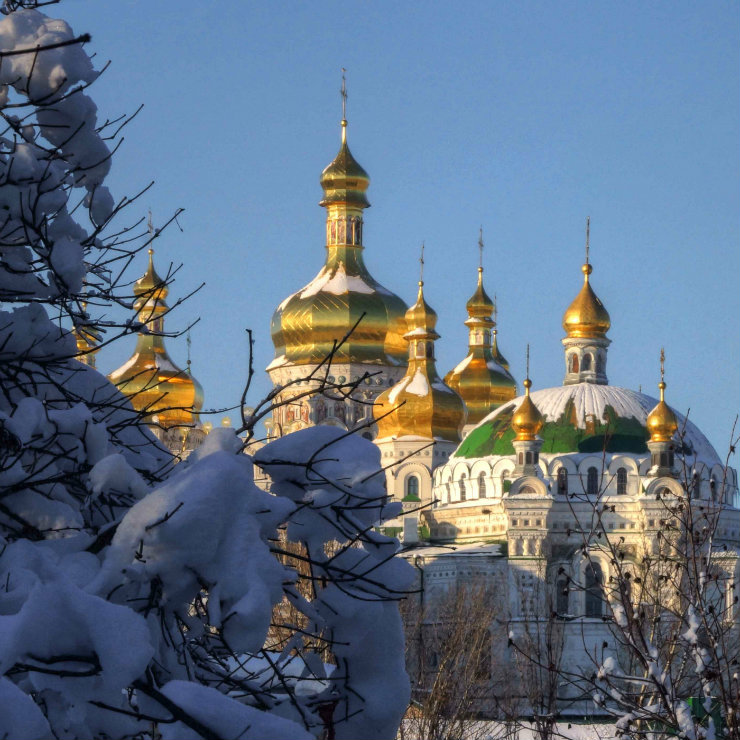
Kiev, Ukraine (mariusz kluzniak, CC BY-NC-ND)
Ukraine’s President Petro Poroshenko recently published on his Facebook page: “No country in the world has managed to move simultaneously in two directions: to oppose external aggression and implement reforms. Ukraine does this every day. We have already managed to create a basis and embarked on the path of development. And now the Ukrainian economy shows a tendency towards growth. This is one of our main achievements on the path of reforms.”
Ukrainian property rights and the reform program were the subject of the 153rd mBank/CASE (Center for Social and Economic Research) seminar. Although the title concerned property rights, Mr Åslund ranged further and deeper.
Can Ukraine achieve the goal of respecting property rights? The short answer was no. Property rights do not exist and investors would be unwise to invest there. Ukraine’s GDP is USD100bn but USD140bn is stashed abroad. As long as this practice continues it will hamper any real reforms, says Mr Åslund.
The Economic Reforms
Mr Åslund stated that it was surprising that Ukraine achieved so much. The most important factor was the abolition of energy arbitrage, which, he argued, concentrated money and power in the hands of the few. The abolition of this practice has led to an 80 per cent increase in household gas prices, somewhat ameliorated by subsidies but largely accepted by the consumer.
Also pension reform has been carried out and pension spending, as a percentage of GDP, has fallen from 17 per cent to 11 per cent, while in Europe 9 per cent is the norm. Ukraine had high payroll taxes of 45 per cent and has reduced these to 22 per cent.
Significant is the banking reform, in which 50 per cent of 180 banks have been closed. This has restricted the abuse of the banking structure for personal gain. The plunder of up to 90 per cent of a banks’ assets was a common thing. Mr Åslund gave an example of Privat Bank, whose borrowers were 500 mailbox companies registered in Northern Cyprus. It was all too easy to buy or set up a bank, take out loans and run the bank into the ground, whilst asking the central bank for a bailout.
The problem is not a handful of oligarchs, he continued, but an over privileged elite with connections to the government , bureaucracy and judiciary.
The Judicial Dimension
Legal and judicial reforms have progressed very slowly and can be counted as a failure. The East German, Estonian and Georgian governments abolished the old structures and created new institutions, but Ukraine seems to tinker.
There is a dichotomy between theory and reality. In 2014 a law on state prosecutors was introduced but did little in practice to curb the power of the prosecutor, who on the basis of information acquired during an investigation, may be able to extort money from interested parties.
Mr Åslund called for boldness and more radical action. The SBU, Ukrainian security services, should be abolished and its number of FTEs should be reduced from 22,000 down to 9,000. Again, this is a particular area where knowledge gained on official business is translated to personal power and wealth.
As far as the judiciary goes, Mr Åslund gave an example that there were 10,000 vacancies for judges. In 2016, 1,600 resigned after revealing their assets and incomes. The Supreme Court should be open to outsiders but has re-elected itself, therefore perpetuating the old connections.
The various security institutions are overstaffed.There are 300,000 FTEs in the police force, 70,000 in the State Fiscal service, and around 30,000 in the SBU. The disestablishment of the one disciplined force, the much feared Birkut, meant that many joined the underworld or hired themselves out to both sides in the Donbas war. Furthermore, he continued, it is estimated that between 30-60 per cent of the SBU are agents of the GRU.
In 2014, the EU forced Ukraine to adopt anti-corruption laws and bodies similar to what Romania and Latvia did. The anti-corruption bureau is on a collision course with the Prosecutor General’s office and since the cases have to go through the old system rather than new anti-corruption courts this will only worsen.
Electoral impasse
There has been no movement on electoral reform, and Mr Åslund’s analysis of parliament was negative, as it supports the privileged. Electoral costs are very high, the 2012 elections cost USD2bn (German cost USD90m and Swedish USD12m).
The striving for transparency in public life has been most successful. In 2016, 100,000 public officials had to declare their assets and incomes. One member of parliament had USD69m in cash at home. Many had USD700,000 in cash and USD100m in assets.
Mr Åslund contrasted this with the Swedish experience and the Transparency Law of 1766, that was introduced to halt corruption from Russia and France among the aristocrats. Only national security and medical records didn’t have to comply. All other information concerning incomes and taxes is public.
Generally, society supports the reforms although there is a traditional scepticism. The leadership is vacillating under pressure from the EU and IMF. Mr Poroshenko has one of the hardest jobs to do. He once wrote that one of the main successes was the GDP growth of 2.5 per cent in H1’17, with an inflation rate of 10.2 per cent in September.


